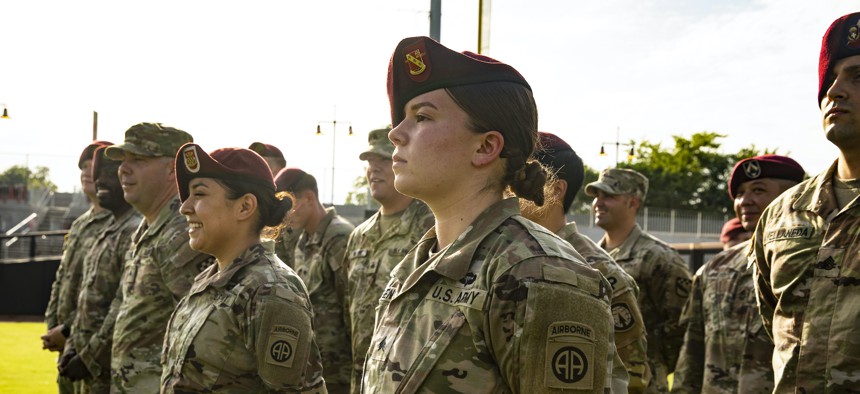
Soldiers from across the XVIII Airborne Corps stand in formation before an oath-of-enlistment ceremony at Segra Stadium in Fayetteville, N.C., on June 14, 2022. U.S. Army / Spc. Joshua Cowden
Military Sexual Assaults Surged in 2021, Report Shows
Pentagon’s annual report also reveals that fewer people trust the military system for dealing with such assaults.
The number of reported military sexual assaults spiked last year, with a 13 percent increase in reports over the previous year, while service members’ trust in the military system plummeted, according to a report released Thursday by the Pentagon.
Troops reported 8,866 sexual assaults in fiscal 2021, up from 7,816 in fiscal 2020. The military believes only about 20 percent of troops who are sexually assaulted report the incidents, and based on a survey done in late 2021 and early 2022, estimate that 35,875 active-duty service members experienced “unwanted sexual contact” in fiscal 2021.
Nearly half of the cases were reported by soldiers. The Army’s 25-percent increase from to 3,250 in 2020 to 4,081 in fiscal 2021 was the largest among the services. The Army also had the highest reporting rate of any service, with 7.1 reports per thousand soldiers. The Air Force had the lowest rate, at 4.6 reports per thousand airmen.
The news comes as the Pentagon works to make sweeping changes to its justice system, handling of sexual assault and harassment cases, and culture, propelled in part by public outrage after the 2020 murder of Army Spc. Vanessa Guillen.
Like many defense secretaries before him, Lloyd Austin has said repeatedly that reducing sexual assaults in the military is one of his top priorities. One of his first acts in office was to establish an independent review commission to identify the changes necessary to prevent these crimes from happening, to hold attackers accountable, and to provide proper support for victims. But many of the recommended changes have not been implemented yet—including an impending overhaul of the Uniform Code of Military Justice.
On Thursday, Austin said the Congressionally mandated annual report shows that sexual assault and sexual harassment are “persistent and corrosive problems” and underscore the “importance and urgency” of the work the Pentagon is doing.
Army Secretary Christine Wormuth said she was “deeply concerned” by the increases. “I expect our leaders to maintain positive command climates where our soldiers feel safe and can thrive,” she said in a written statement.
Sexual assault is historically underreported, both in the civilian and military justice systems. So to get a better idea of how many such assaults are happening in the military, Congress in 1988 mandated that the Pentagon conduct an anonymous survey of service members. The survey has been done every two years since 2010—until 2020, when it was curtailed due to COVID-19. The survey included in this year’s report is the first since 2018, and used different questions than previous versions, according to the report. More than 69,500 active-duty and more than 29,100 Reserve troops completed the survey.
In addition to the estimate that 35,875 active-duty troops experienced unwanted sexual contact last year, the survey found that trust in the military system had plummeted to historic lows.
In 2010, 2012, 2014, and 2018, the percentage of men who agreed that they could trust the military to protect their privacy was in the 70s, and the percentage of women was generally in the 60s. This year, just 58 percent of men and 34 percent of women agreed that they could trust the military to protect their privacy. Other survey questions about trust in the system garnered similar results.
Sen. Kirsten Gillibrand, D-N.Y., said the results of the survey are disturbing and show “a military in crisis.”
Rep. Jackie Speier, D-Calif., agreed, saying the drop in trust “only raises more red flags.”







